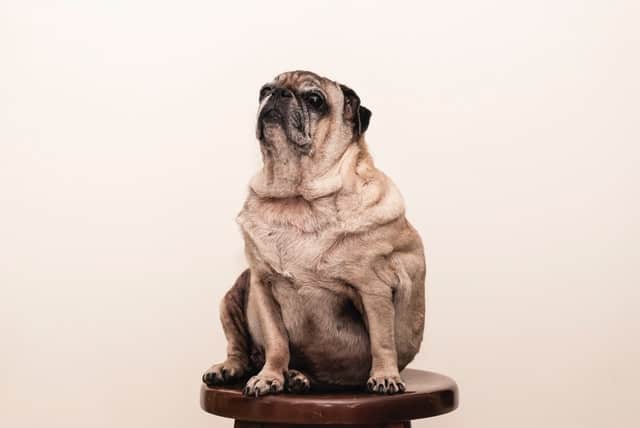
Obesity, just like in humans, can cause many health problems for our dogs. Here are its main causes.
Obesity in dogs is an increasingly common problem. Weight, in fact, affects the health of our four-legged friends. Nutrition, exercise and genetics are determining factors and, as owners, we must keep an eye on the first two to avoid diseases associated with obesity.
In this article we talk about the most common causes that we need to check to avoid obesity in dogs.
Obesity in dogs: the 5 most common causes
1. Overeating, the leading cause of obesity in dogs
Overeating is probably the leading cause of obesity in dogs. The daily ration that we give to our faithful friend must correspond to his ideal weight (ie the kilos he should weigh taking into account the size, height and age).
The ideal weight is indicated on the packaging of the dog food. If our dog is already overweight and we feed him based on his actual weight, and not based on his ideal weight, it will only worsen his condition.
Overfeeding can be just as dangerous as feeding them the wrong diet . Low-quality food and an excess of high-calorie foods can lead to overweight and obesity.
To buy quality food we must focus on the composition, the origin of the proteins, the variety of ingredients and the presence of dyes or additives.
The quality of the snacks should also be checked; we should never give our dog too many compared to what he can eat.
2. Sedentarism
Sedentary pets tend to gain weight easily, especially if they are not fed properly. From this point of view, exercise is a very important component.
Dogs have to go for a walk several times a day and, at least one of these moments, must last at least an hour. If you take him for a walk to a place where he can run, smell and play with other dogs, so much the better.
The most energetic dogs can practice agility , a very complete exercise in which to release their energy and improve the bond with their owner.
3. Eat the leftovers
Food for us humans contains many more calories than food for animals and, even if the leftovers we give to our dog may seem small to us, it is actually an excess of calories. One of the elements most present in our food but extremely harmful to animals is sugar.
Furthermore, getting our four-legged friend used to eating leftovers will make him indifferent to his food, as well as having him at the table during our meal in the hope of receiving some.
We have to get used to feeding our dog following set times and without leaving the bowl full for the whole day. Make him eat only twice a day.
4. Diseases that cause obesity in dogs
There are hormonal diseases that can cause weight gain. If your dog is gaining a lot of pounds in a short time, and for no apparent reason, consult a veterinarian to find out if there are any diseases.
5. Genetics and age
Obesity in dogs is much more common in some breeds than others : the Labrador, the Golden Retriever, the Dachshund , the Bulldog, the Pug are just a few examples.
In addition, as we age, the dog’s energy needs change, so we will have to adjust the quantities of food to his new needs. A puppy needs energetic food and to eat more often than an adult or senior dog. Females also need more food during the gestation and lactation period.
Castration can be one of the causes of obesity in dogs, but it is a factor that can be kept totally under control if we follow a correct balance between nutrition and exercise.
What we have seen are the five main causes of obesity in dogs. Remember how maintaining a healthy weight is a preventative measure for serious and insidious ailments such as diabetes . There are specific foods for obese dogs that, combined with progressive exercise, can help your dog regain his ideal weight.






